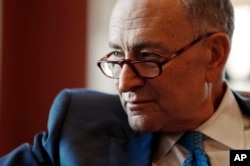President-elect Donald Trump's announcement Friday that he planned to nominate Senator Jeff Sessions as his attorney general drew both fire and praise over Sessions' record on civil rights and tough immigration stance.
The 69-year-old Republican has been one of the most conservative voices in the U.S. Senate for 20 years. He previously served as U.S. attorney for the Southern District of Alabama and later as Alabama's attorney general.
Throughout the tumultuous campaign, Sessions remained loyal to Trump and advised him on a range of decisions and policy issues, including national security, immigration and staffing for key positions.
In a statement, Trump heaped praise on Sessions. The senator has "a world-class legal mind" and is "greatly admired by legal scholars and virtually everyone who knows him," Trump said.
In the same statement, Sessions expressed enthusiasm for "President-elect Trump's vision for one America and his commitment to equal justice under law." He added, "I look forward to fulfilling my duties with an unwavering dedication to fairness and impartiality."
Critics irate
Critics, including civil rights groups, swiftly expressed outrage.
A statement by the American Civil Liberties Union (ACLU) cited Sessions' "reported history of making racist comments" and noted the nation's top law enforcement officer must protect the rights of all Americans.
Executive Director Anthony Romero vowed the ACLU would "closely examine his stances on key issues" until it had the confidence Sessions would uphold the Constitution for all Americans.
Sessions was nominated for a federal judgeship 30 years ago but withdrew his name after he was accused in testimony of making racist remarks while he was a U.S. attorney in Alabama.
During the 1986 hearing, former Assistant U.S. Attorney Thomas Figures, an African-American, testified that Sessions had referred to him as "boy" and warned Figures to be careful about what he said to "white folks." Sessions denied the claim.
Former colleagues also testified that Sessions joked that the Ku Klux Klan, a white extremist group, was "OK until he learned they smoked marijuana."
Trump aides defended the pick. Spokesman Sean Spicer noted that Sessions worked on desegregation lawsuits while he was a U.S. attorney, voted to confirm Eric Holder as attorney general — the first African-American to hold the post — and led an effort to award the Congressional Gold Medal to civil rights activist Rosa Parks.
Opposition to immigration bills
Sessions has also been praised and criticized for his anti-immigration position.
Throughout his time in the Senate, Sessions has opposed most immigration bills, including measures that supported legal immigration.
"It's hard to imagine a better pick for the attorney general position than Senator Jeff Sessions," said Dan Stein, president of the Federation for American Immigration Reform (FAIR).
In a statement, Stein predicted Sessions "would put an end to the flagrant violation of federal immigration law by the more than 300 sanctuary cities and jurisdictions across the nation."
However, the attorney general's role on immigration issues is not as great as it used to be, according to Theresa Brown, director of immigration policy at the Bipartisan Policy Center in Washington.
She said that while the Department of Justice oversees immigration court cases, many other functions have shifted to the Department of Homeland Security.
"I think actually a Homeland Security secretary will have a more direct and more important role in immigration policy in a Trump administration than the attorney general," Brown said. "I'm not saying the attorney general doesn't have a role, but under the authorities, the Homeland Security secretary definitely has more direct contact."
What to expect
The attorney general oversees all federal law enforcement agencies, U.S. attorneys and prosecutions in the country. Brown said that Sessions, if confirmed, most likely would take a fresh look at current policies.
"I understand that Senator Sessions was a strong proponent, for example, of enforcing marijuana legislation, federal marijuana laws, even where states have voted to liberalize," Brown said.
Even though Sessions is viewed as espousing hard-line views, analysts said, he has shown a willingness to compromise with his Democratic counterparts.
"We feel very confident that Senator Sessions has the background and the support to receive confirmation," Spicer said.
Incoming Senate Minority Leader Chuck Schumer, a Democrat from New York, signaled that Sessions would face tough questions during confirmation hearings.
"Given some of his past statements and his staunch opposition to immigration reform, I am very concerned about what he would do with the Civil Rights Division at the Department of Justice and want to hear what he has to say," Schumer said in a statement.
Senate Majority Leader Mitch McConnell, a Republican from Kentucky, called for quick confirmation.
"I look forward to the Senate's fair and expeditious treatment of our colleague's forthcoming nomination, just as it promptly processed President [Barack] Obama's first attorney general nomination, which concluded with a timely up-or-down vote," McConnell said.





![FILE - American Civil Liberties Union Executive Director Anthony Romero says his organization will "closely examine [Jeff Sessions'] stances on key issues" until it has the confidence that as attorney general he will uphold the Constitution for all Americans.](https://gdb.voanews.com/3D4A0A9B-E249-4B04-BBCA-CE76FC63AB11_w250_r0_s.jpg)

